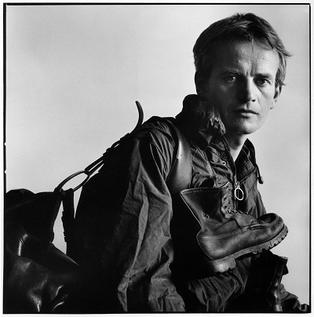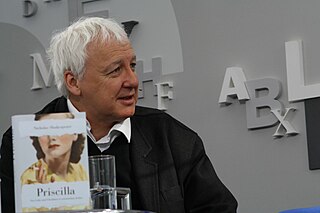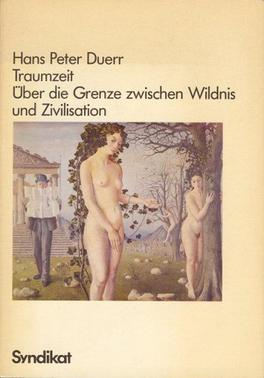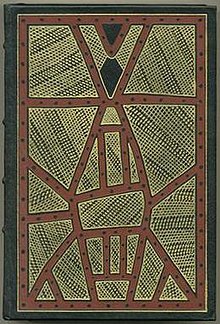
The Dreaming, also referred to as Dreamtime, is a term devised by early anthropologists to refer to a religio-cultural worldview attributed to Australian Aboriginal beliefs. It was originally used by Francis Gillen, quickly adopted by his colleague Baldwin Spencer and thereafter popularised by A. P. Elkin, who, however, later revised his views.
Robyn Davidson is an Australian writer best known for her 1980 book Tracks, about her 2,700 km trek across the deserts of Western Australia using camels. Her career of travelling and writing about her travels has spanned 40 years.

Charles Bruce Chatwin was an English travel writer, novelist and journalist. His first book, In Patagonia (1977), established Chatwin as a travel writer, although he considered himself instead a storyteller, interested in bringing to light unusual tales. He won the James Tait Black Memorial Prize for his novel On the Black Hill (1982), while his novel Utz (1988) was shortlisted for the Booker Prize. In 2008 The Times ranked Chatwin as number 46 on their list of "50 Greatest British Writers Since 1945."
Keith Windschuttle is an Australian historian and former board member of the Australian Broadcasting Corporation. He was editor of Quadrant from 2007 to 2015 when he became chair of the board and editor-in-chief. He was the publisher of Macleay Press which operated from 1994 to 2010.

Australian literature is the written or literary work produced in the area or by the people of the Commonwealth of Australia and its preceding colonies. During its early Western history, Australia was a collection of British colonies; as such, its recognised literary tradition begins with and is linked to the broader tradition of English literature. However, the narrative art of Australian writers has, since 1788, introduced the character of a new continent into literature—exploring such themes as Aboriginality, mateship, egalitarianism, democracy, national identity, migration, Australia's unique location and geography, the complexities of urban living, and "the beauty and the terror" of life in the Australian bush.
A songline, also called dreaming track, is one of the paths across the land within the animist belief systems of the Aboriginal cultures of Australia which mark the route followed by localised "creator-beings" in the Dreaming. The paths of the songlines are recorded in traditional song cycles, stories, dance, and art, and are often the basis of ceremonies. They are a vital part of Aboriginal culture, connecting people to their land.

Nicholas William Richmond Shakespeare FRSL is a British novelist and biographer, described by the Wall Street Journal as "one of the best English novelists of our time".
Nigel Frederick Barley is a British anthropologist known for his books based on his anthropological field work, which have been treated as travel writing. His first book The Innocent Anthropologist (1983), was an account of field work in Cameroon and was positively reviewed.

Patricia Wrightson OBE was an Australian writer of several highly regarded and influential children's books. Employing a 'magic realism' style, her books, including the award-winning The Nargun and the Stars (1973), were among the first Australian books for children to draw on Australian Aboriginal mythology. Her 27 books have been published in 16 languages.
B. Wongar is a Serbian-Australian writer. For most of his literary career, the concern of his writing has been, almost exclusively, the condition of Aboriginal people in Australia. His 1978 short story collection, The Track to Bralgu, was released to critical acclaim by the foreign press, who were led to believe by publisher Little Brown that Wongar was of Aboriginal ethnicity. The revelation that Wongar was a Serbian immigrant, as well as inconsistencies in his life story, have led to controversy and allegations of literary hoax and cultural appropriation.

Occupational Hazards: My Time Governing in Iraq or The Prince of the Marshes: And other Occupational Hazards of a Year in Iraq is a 2006 non-fiction book by the British writer and later Member of Parliament Rory Stewart.
Diane Robin (Di) Bell is an Australian feminist anthropologist, author and activist. She is Professor Emerita of Anthropology at the George Washington University in Washington, D.C, USA and Distinguished Honorary Professor of Anthropology at the Australian National University, Canberra. Her work focuses on the Aboriginal people of Australia, Indigenous land rights, human rights, Indigenous religions, violence against women, and on environmental issues.
Walkabout is a rite of passage in Australian Aboriginal society, during which males undergo a journey during adolescence, typically ages 10 to 16, and live in the wilderness for a period as long as six months to make the spiritual and traditional transition into manhood.
Louis Kaye was the pseudonym of Noel Wilson Norman, an Australian novelist and short story writer. He also published short stories under the names Grant Doyle Cooper and James Linnel.

Dreamtime: Concerning the Boundary between Wilderness and Civilization is an anthropological and philosophical study of the altered states of consciousness found in shamanism and European witchcraft written by German anthropologist Hans Peter Duerr. First published in 1978 by Syndikat Autoren-und Verlagsgesellschaft under the German title of Traumzeit: Über die Grenze zwischen Wildnis und Zivilisation, it was translated into English by the Hungarian-American anthropologist Felicitas Goodman and published by Basil Blackwell in 1985.
Bruce Pascoe is an Aboriginal Australian writer of literary fiction, non-fiction, poetry, essays and children's literature. As well as his own name, Pascoe has written under the pen names Murray Gray and Leopold Glass. Since August 2020, he has been Enterprise Professor in Indigenous Agriculture at the University of Melbourne.

Who Will Remember the People... is a 1986 novel by the French writer Jean Raspail. It tells the history of the Alacalufe people, a largely extinct South American tribe, throughout the centuries. The two main characters reappear in each generation. The native name of the Alacufs is "Kaweskar", which means "the people". Raspail had met members of the tribe in the early 1950s which had made an impression that stayed with him.

Nomad: In the Footsteps of Bruce Chatwin is a 2019 British documentary film by German director Werner Herzog. It chronicles the life of British travel writer Bruce Chatwin and includes interviews with Chatwin's widow, Elizabeth Chatwin, and biographer Nicholas Shakespeare, as well as detailing Herzog's own friendship and collaboration with the man.

Dark Emu: Black Seeds: Agriculture or Accident? is a 2014 non-fiction book by Bruce Pascoe. It reexamines colonial accounts of Aboriginal people in Australia, and cites evidence of pre-colonial agriculture, engineering and building construction by Aboriginal and Torres Strait Islander peoples. A second edition, published under the title Dark Emu: Aboriginal Australia and the Birth of Agriculture was published in mid-2018, and a version of the book for younger readers, entitled Young Dark Emu: A Truer History, was published in 2019.

Farmers or Hunter-Gatherers? The Dark Emu Debate is a non-fiction book on Indigenous Australian history by Peter Sutton and Keryn Walshe, published in mid-2021 by Melbourne University Press. It was written as a response to Bruce Pascoe's highly successful 2014 non-fiction book Dark Emu: Black Seeds: Agriculture or Accident? which describes evidence of agricultural and engineering activities by some Indigenous Australian groups, and suggests a more sedentary lifestyle than the more orthodox assessment that they were purely hunter-gatherers. Sutton and Walshe reject Pascoe's thesis of Indigenous agriculture, and argue that his book contains serious errors and omissions.












